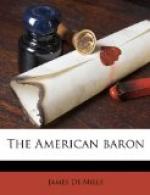“By Jove!” cried Hawbury. “This is deuced odd, do you know, old chap; and I can’t imagine how the mischief you got here!”
This led to long explanations, and a long conversation, which was protracted far into the night, to the immense enjoyment of both of the friends.
The Baron was, as Lord Hawbury had said, an old friend. He had become acquainted with him many years before upon the prairies of America, near the Rocky Mountains. The Baron had rescued him from Indians, by whom he had been entrapped, and the two friends had wandered far over those regions, enduring perils, fighting enemies, and roughing it in general. This rough life had made each one’s better nature visible to the other, and had led to the formation of a friendship full of mutual appreciation of the other’s best qualities. Now it is just possible that if they had not known one another, Hawbury might have thought the Baron a boor, and the Baron might have called Hawbury a “thundering snob;” but as it was, the possible boor and the possible snob each thought the other one of the finest fellows in the world.
“But you’re not a Roman Catholic,” said Hawbury, as the Baron explained his position among the Zouaves.
“What’s the odds? All’s fish that comes to their net. To get an office in the Church may require a profession of faith, but we’re not so particular in the army. I take the oath, and they let me go. Besides, I have Roman Catholic leanings.”
“Roman Catholic leanings?”
“Yes; I like the Pope. He’s a fine man, Sir—a fine man. I regard that man more like a father than any thing else. There isn’t one of us but would lay down our lives for that old gentleman.”
“But you never go to confession, and you’re not a member of the Church.”
“No; but then I’m a member of the army, and I have long chats with some of the English-speaking priests. There are some first-rate fellows among them, too. Yes, Sir.”
“I don’t see much of a leaning in all that.”
“Leaning? Why, it’s all leaning. Why, look here. I remember the time when I was a grim, true-blue Puritan. Well, I ain’t that now. I used to think the Pope was the Beast of the ’Pocalypse. Well, now I think he’s the finest old gentleman I ever saw. I didn’t use to go to Catholic chapel. Well, now I’m there often, and I rather kind o’ like it. Besides, I’m ready to argue with them all day and all night, and what more can they expect from a fighting man?
“You see, after our war I got my hand in, and couldn’t stop fighting. The Indians wouldn’t do—too much throat-cutting and savagery. So I came over here, took a fancy to the Pope, enlisted, was at Mentana, fit there, got promoted, went home, couldn’t stand it, and here I am, back again; though how long I’m going to be here is more’n I can tell. The fact is, I feel kind of onsettled.”
“Why so?”
“Oh, it’s an aggravating place, at the best.”




